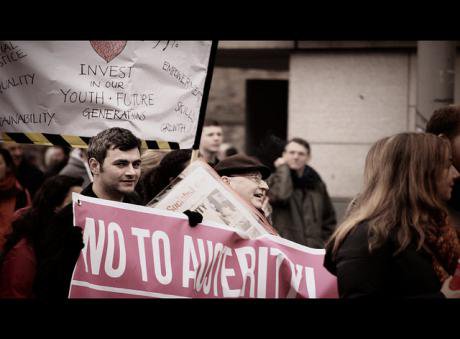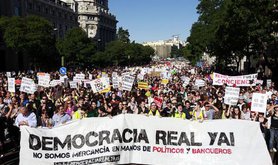
Flickr/DigitailWag. Some rights reserved.
Since the signing of the first Economic Adjustment Programme in 2010, a growing number of independent documentaries have been produced and circulated online. At a time when austerity policies had been worsening media production within Greece, and neoliberal media agendas across Europe have been setting the propaganda machine against Greece in motion, documentary production was blooming. What is perhaps even more striking than the growth of independent media (and especially documentary) production is their public availability. Out of 45 documentaries of various lengths currently in the archive #greekdocs, the striking majority (32) are available online for free, for streaming or downloading. This of course creates both opportunities for the enhancing of public debate as well as difficulties in guaranteeing the sustainability of guerrilla documentary which often relies on crowdfunding, but also aims to attract a much bigger audience.
In this short piece, I briefly introduce the archive and contextualise its genesis. Meanwhile, I invite you to participate in the process of archiving by informing me of any documentaries that should be on the archive. Additionally, any ideas on how to improve this activist archive, and what aspects of media distribution under austerity it can support, are very welcome. There are several reasons to be wary of the demise of media under austerity, and plenty of reasons to invent and support alternative media production in spite of austerity.
Austerity has had severe direct effects or side effects on media culture in Greece. The public broadcasting landscape of the country has suffered in terms of the quality of public debate even before the crisis. A historical overview of the sector illuminates “the cultivation of close relationships between the press and political power”, and the political speech presented in the mainstream media has often been locked within the partisan agendas of such channels up to the present day. Under austerity, the media in Greece have come under great duress. In 2013, the public service broadcaster (ERT) saw the austerity axe and was forcefully shut down, while the new one (NERIT) was installed some months later. Public trust towards NERIT as an independent broadcaster remains questionable, especially after the ‘interview’ of former PM Samaras with NERIT reporters which was denounced by the Journalists’ Union of Athens Daily Newspapers. There are many more issues with the state of Greek media, including the protectionism that press barons can afford to their journalists. For example, the 2015 referendum (asking whether to accept the outline of the agreement submitted by Troika) brought people to the streets (for both the Yes and No vote), but also the mainstream media to a state of frenzy. A classic exposure of the biases of the Greek media was in the week leading to the referendum, when a journalist on prime time news uttered: “it is not my fault that all the social groups are supporting the Yes vote” when her objectivity was questioned by a Syriza MP on air. For these reasons and more, in 2016 Greece ranked 89th in the World Press Freedom Index, a position that had improved but only slightly in the last couple of years.
In a national landscape where mainstream media are engulfed in partisan and business relationships, and frame the crisis according to their interests, documentary has witnessed a significant growth, ranging from amateur film-making to independent investigative journalism. A range of citizens, journalists and other creatives have taken to reframing the crisis and the extent of everyday as well as systemic injustice. Independent media production in the context of austerity can allow for an exploration of documentary as a genre at the crossroads of journalistic and activist practice when trust in mainstream media institutions has significantly waned.
In 2014, we ran a workshop on public culture, austerity and documentary in Greece, dedicated to understanding some of the dimensions in the production and distribution of documentaries which chronicled the crisis. The hashtag #greekdocs started at the same time with the aim to identify and enhance the presence of documentaries under austerity. In November 2015, the archive was set up as a platform for the documentaries that had been identified. The idea behind it is to enhance the information ecology and promote the visibility of such media in public culture, while more often than not there is a subtitled version of the documentary available. The blog enhances this archive and contributes to the improvement of the media ecology in Greece. Also, it aims to counter national stereotypes by demystifying the social conditions of austerity through bottom-up media production.
The documentaries in the digital archive range from works that address the crisis by examining the location of power at the transnational level (for example, Debtocracy, 2011; Catastroika, 2012; Citizend, 2015; This is a Coup, 2015; This is Not a Coup, 2016), by looking at situations created or worsened by conditions of austerity (for example, Future Suspended, 2014; WAteRdrops, 2014; Next Stop: Utopia, 2015; Non Omnis Moriar, 2015) and by exploring everyday life at the wake of the crisis (for example, Portraits of crisis, 2013; Greece: Days of Change, 2014; Anti-consumption in crisis, 2015). The majority of the topics examined include public sector cuts and unemployment (Portraits of unemployment #1, #2, #3, 2013; Greece on the brink, 2014; Agorá, 2015), the media system (Greek Honey Puffs: Media’s propaganda cookbook, 2012; The Lost Signal of Democracy, 2013), the rise of fascism (Into the Fire, 2013; Fascism, Inc., 2014; Golden Dawn: A Personal Affair, 2016), but also the presentation of alternatives (Knowledge as a common good: Communities of Production and Sharing in Greece, 2014; Street Art in Exarchia, 2015) and more recently the refugee crisis (The Border, 2016; Island of Refuge, forthcoming). The topics are often interrelated; for example Ruins: Chronicle of an HIV witch-hunt (2013) interlaces a critique of the Greek media, politics and a society in crisis in its documentation of the vile treatment of HIV positive women. Similarly, Solitaire Ou Solidaire (2016) explores the case of the social clinic of solidarity in Thessaloniki which was created as a result of the hunger strike of 300 immigrant workers in 2011 highlighting solidarity at the intersection of healthcare, immigration and a social crisis.
Most of the documentaries in the archive are independent productions, typically crowdfunded (Debtocracy, 2011; Catastroika, 2012; Into the Fire, 2013; Fascism, Inc., 2014; Greece, Europe, Undemocracy, 2015; This is Not a Coup, 2016), while some are produced by independent filmmakers and journalists (Agorá, 2015; Next Stop: Utopia, 2015; This is a Coup, 2015). #greekdocs is a live platform dedicated to the aggregation and dissemination of such works. It has a Facebook page and a Twitter account and invites you to use the #greekdocs hashtag to add documentaries to this nascent archive.
Read more
Get our weekly email



Comments
We encourage anyone to comment, please consult the oD commenting guidelines if you have any questions.